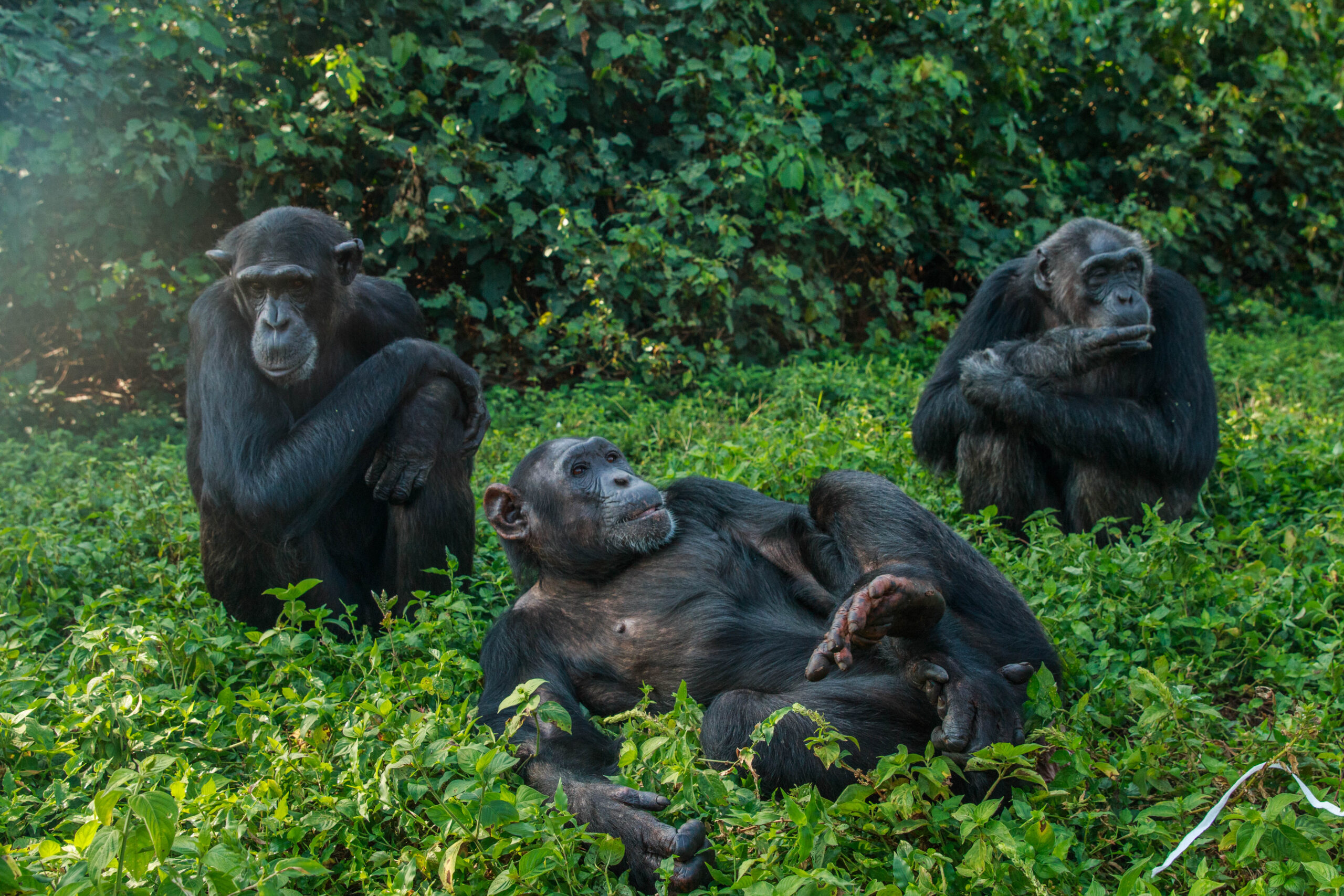Written by Philip Briggs
Ngamba Island is set in the tropical Ugandan waters of Lake Victoria. The formerly uninhabited island, which extends across 38.5ha/95ac was established in 1998 as a sanctuary for orphaned and other chimpanzees rescued from poachers. It was chosen because it supports a lush cover of near-pristine tropical rain forest including more than 50 plant species utilized by chimps in the wild. Ngamba is less than an hour by boat from Entebbe, Uganda’s main international airport. Today this island is one of the country’s most popular and rewarding tourist attractions. Here are five reasons why we think it should be included on any safari itinerary through Uganda.
1. The chimps…obviously!
Ngamba provides arguably the best opportunity anywhere in Africa to observe chimpanzee behavior and interaction at close quarters. More than 95 per cent of the island is set aside as a forested sanctuary. Here, a community of 50 chimps roams and forages freely. Separated from this by an electric fence is the compact visitors center. An elevated viewing platform allows visitors to observe and photograph the chimps twice-daily feeding times.
Watching these fascinating black-coated apes is an absorbing experience. They feed, groom, squabble, play and generally carry on like seasoned players in an unscripted soap opera. Humans and chimps are more closely related to each other than to any other living creatures. This close genetic relationship makes so many of their actions, mannerisms and facial expressions instantly recognizable. While there are several other places in Uganda where chimpanzees can be tracked in the wild, none is quite so reliable as Ngamba.
2. Bird watching and other wildlife
The jungle island forms a natural sanctuary for plenty of other wildlife
Despite its relatively small area, Ngamba Island is home to more than 150 species of forest- and water-associated birds. The handsome African fish eagles perform their rousing high-pitched duets in lakeshore trees. And many different species of (mostly yellow) weaver nest in the reedbeds. Less conspicuous but more dazzling still are the African paradise-flycatchers, brightly marked turacos, loud hornbills and various other colorful species. Patient photographers can try to capture images of some of these birds from a lakeshore hide. Often there are also sightings of the hefty Nile Monitor lizard and endearing spotted-necked otter.
3. Overnighting in Ngamba is a fabulous back-to-nature alternative to Entebbe or Kampala
Entebbe is the site of Uganda’s only international airport. Therefore, almost all safaris start and end with a night there or in the nearby capital Kampala. For nature lovers, the small but luxurious Ngamba Eco-Lodge forms a far more appealing alternative. It has four cottages and 15 standing tents perched right on the water’s edge. Enjoy a hearty outdoor dinner, followed by a lively cultural experience of Ugandan music and dancing around the campfire. Then fall asleep to the sound of lapping water and chirping frogs, interrupted by the occasional pant-hoot calls of the island’s resident chimps.
4. A thrilling 45-minute boat trip across Africa’s largest lake
The boat trip from Entebbe to Ngamba traverses Lake Victoria. This vast freshwater lake has a surface area of 60,000km2/23,200mi2. This is comparable to the US state of Georgia and twice as large as Belgium. Lake Vic is also the primary source of the Nile, the world’s longest river. It flows out from the northern shore at nearby Jinja. What’s more, the lake’s equator-straddling location means that the short boat trip from Entebbe actually crosses from the northern hemisphere to the southern. Once at the island, overnight visitors can go on a tranquil sunset cruise or a more energetic angling excursion trying to hook a giant Nile perch.
5. Tourist visits to Ngamba help fund other conservation efforts and environmental education
The chimp sanctuary on Ngamba Island is essentially an animal orphanage. It provides comfortable living conditions, an amenable social environment and world-class medical care to its inmates. But it is not a breeding facility. All adult females are given a contraceptive implant that prevents them from reproducing without disrupting normal sexual behavior. It also does not attempt to reintegrate the chimps back in the wild. Despite this Ngamba plays an important role in the broader conservation of chimpanzees. It is the flagship project of a conservation trust affiliated to the Jane Goodall Institute. The sanctuary funds an ongoing census of wild populations countywide in Uganda and operates snare-removal programs. It also provides education and other outreach initiatives to local communities.

